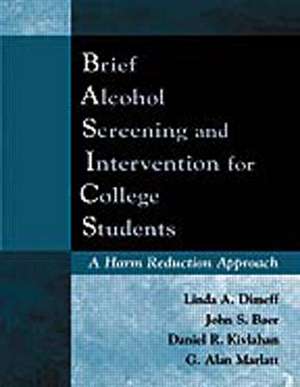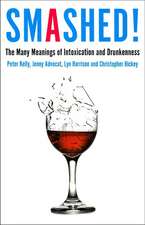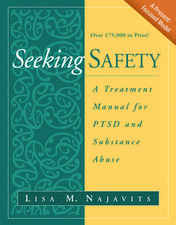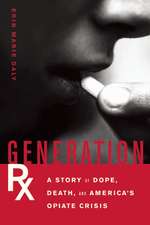Brief Alcohol Screening and Intervention for College Students (BASICS): A Harm Reduction Approach
Autor Linda A. Dimeff, John S. Baer, Daniel R. Kivlahan, G. Alan Marlatten Limba Engleză Paperback – 24 iun 1999
This instructive manual presents a pragmatic and clinically proven approach to the prevention and treatment of undergraduate alcohol abuse. The BASICS model is a nonconfrontational harm reduction approach that helps students reduce their alcohol consumption and decrease the behavioral and health risks associated with heavy drinking. Including numerous reproducible handouts and assessment forms, the book takes readers step by step through conducting BASICS assessment and feedback sessions. Special topics include the use of DSM-IV criteria to evaluate alcohol abuse, ways to counter student defensiveness about drinking, and obtaining additional treatment for students with severe alcohol dependency.
Preț: 265.02 lei
Preț vechi: 278.96 lei
-5% Nou
Puncte Express: 398
Preț estimativ în valută:
50.76€ • 52.29$ • 42.52£
50.76€ • 52.29$ • 42.52£
Carte tipărită la comandă
Livrare economică 24 februarie-10 martie
Preluare comenzi: 021 569.72.76
Specificații
ISBN-13: 9781572303928
ISBN-10: 1572303921
Pagini: 200
Dimensiuni: 210 x 280 x 12 mm
Greutate: 0.52 kg
Ediția:New.
Editura: Guilford Publications
Colecția Guilford Press
ISBN-10: 1572303921
Pagini: 200
Dimensiuni: 210 x 280 x 12 mm
Greutate: 0.52 kg
Ediția:New.
Editura: Guilford Publications
Colecția Guilford Press
Public țintă
Postgraduate and Professional Practice & DevelopmentNotă biografică
Linda A. Dimeff, PhD, is a Research Scientist in the Department of Psychology at the University of Washington. Her research and clinical interests range from prevention of alcohol problems in college students to treatment of severely disordered substance abusing individuals with borderline personality disorder. Funded by two grant awards, her dissertation was a replication and extension of BASICS applied in a student health center setting and using multimedia computers, along with provider advice.
John S. Baer, PhD, is Research Associate Professor of Psychology at the University of Washington, and is currently Coordinator of Education at the National Center of Excellence for Substance Abuse Treatment and Education at the VA Puget Sound Health Care System. Dr. Baer's research and clinical interests focus on the assessment, early intervention, and relapse of substance use and abuse. He is the recipient of local and national research grants examining secondary prevention and etiology of alcohol problems.
Daniel R. Kivlahan, PhD, is Director of the National Center of Excellence in Substance Abuse Treatment and Education at the VA Puget Sound Health Care System and Associate Professor of Psychiatry and Behavioral Sciences at the University of Washington School of Medicine. He continues to pursue health services research related to substance use disorders, including development, implementation, and evaluation of evidence-based clinical practice guidelines.
G. Alan Marlatt, PhD, until his death in 2011, was Director of the Addictive Behaviors Research Center and Professor of Psychology at the University of Washington. For over 30 years, Dr. Marlatt conducted pioneering work on understanding and preventing relapse in substance abuse treatment and was a leading proponent of the harm reduction approach to treating addictive behaviors. He was a recipient of honors including the Jellinek Memorial Award for outstanding contributions to knowledge in the field of alcohol studies, the Robert Wood Johnson Foundation's Innovators Combating Substance Abuse Award, the Research Society on Alcoholism's Distinguished Researcher Award, and the Career/Lifetime Achievement Award from the Association for Behavioral and Cognitive Therapies.John S. Baer, PhD, is Research Associate Professor of Psychology at the University of Washington, and is currently Coordinator of Education at the National Center of Excellence for Substance Abuse Treatment and Education at the VA Puget Sound Health Care System. Dr. Baer's research and clinical interests focus on the assessment, early intervention, and relapse of substance use and abuse. He is the recipient of local and national research grants examining secondary prevention and etiology of alcohol problems.
Daniel R. Kivlahan, PhD, is Director of the National Center of Excellence in Substance Abuse Treatment and Education at the VA Puget Sound Health Care System and Associate Professor of Psychiatry and Behavioral Sciences at the University of Washington School of Medicine. He continues to pursue health services research related to substance use disorders, including development, implementation, and evaluation of evidence-based clinical practice guidelines.
Cuprins
Introduction
1. Theoretical and Empirical Overview
2. The Alcohol Skills Training Program
3. Laying the Foundations for BASICS
4. The Initial Assessment Interview
5. The Feedback Interview
6. Clinical Considerations
Appendices:
A. Discussion of Assessment Instruments Relevant to
BASICS
B. Personalized Graphic Feedback and Tips Sheets
C. Harm Reduction Handouts for Students Who Drink
D. A Selection of Published and Unpublished
Assessment Measures
E. References
1. Theoretical and Empirical Overview
2. The Alcohol Skills Training Program
3. Laying the Foundations for BASICS
4. The Initial Assessment Interview
5. The Feedback Interview
6. Clinical Considerations
Appendices:
A. Discussion of Assessment Instruments Relevant to
BASICS
B. Personalized Graphic Feedback and Tips Sheets
C. Harm Reduction Handouts for Students Who Drink
D. A Selection of Published and Unpublished
Assessment Measures
E. References
Recenzii
"Dimeff, Marlatt, and their colleagues at the Addictive Behaviors Research Center have synthesized years of tested and successful harm reduction strategies into a 'best practices' manual. Innovative, clear, and flowing with humane guidance for reducing students' risks, this is a book that moves the harm reduction approach forward in college settings. Used with college students who drink heavily, BASICS can reduce harm and save lives." --Patricia M. Fabiano, MS, MA, Director, Prevention and Wellness Services, Western Washington University
"This book provides a very helpful research-based approach for addressing an all-too-common problem among college students and other young adults: heavy drinking. Its theoretical and conceptual underpinnings provide a quality foundation not only for working with specific individuals, but also for guiding campus wide programmatic efforts. User-friendly and practical, BASICS is a promising approach to dealing with heavy drinking and may be applicable to a range of other health issues as well." --David S. Anderson, PhD, Center for the Advancement of Public Health, George Mason University, Fairfax, Virginia
-"This book provides a very helpful research-based approach for addressing an all-too-common problem among college students and other young adults: heavy drinking. Its theoretical and conceptual underpinnings provide a quality foundation not only for working with specific individuals, but also for guiding campus wide programmatic efforts. User-friendly and practical, BASICS is a promising approach to dealing with heavy drinking and may be applicable to a range of other health issues as well." --David S. Anderson, PhD, Center for the Advancement of Public Health, George Mason University, Fairfax, Virginia
Descriere
This instructive manual presents a pragmatic and clinically proven approach to the prevention and treatment of undergraduate alcohol abuse. The BASICS model is a nonconfrontational harm reduction approach that helps students reduce their alcohol consumption and decrease the behavioral and health risks associated with heavy drinking. Including numerous reproducible handouts and assessment forms, the book takes readers step by step through conducting BASICS assessment and feedback sessions. Special topics include the use of DSM-IV criteria to evaluate alcohol abuse, ways to counter student defensiveness about drinking, and obtaining additional treatment for students with severe alcohol dependency.







